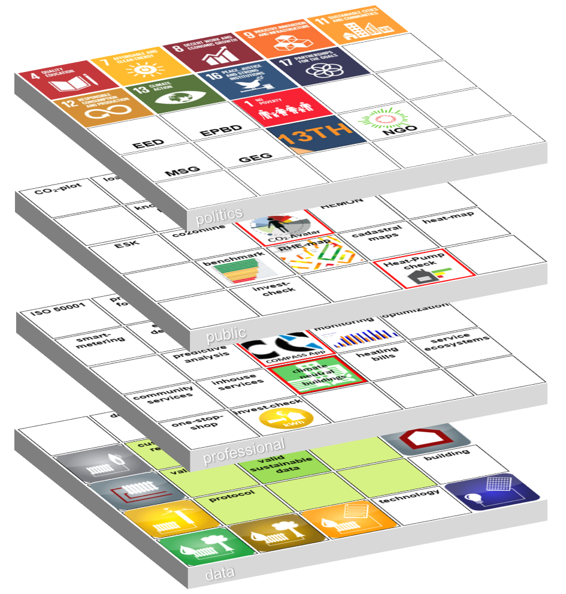Data Tool House for evidence-based climate action
The sustainable data platform is a database system with a stock of valid data that is used for analysis and control in terms of climate neutrality. The platform is under agile and prototypical development for building climate protection tools since 2020. It aims to make factors and causes of the climate crisis transparent and manageable.
To this end, it enables:
- Transparent access to valid data
- Awareness of positive and negative effects of actions
- Taking responsibility for one’s own actions
- Recognizing responsibility for areas beyond
- Targeted action and management
In order to track progress in climate protection and make targeted adjustments where necessary, goals must be defined and results measured.
On the open-source platform, participants develop tools for open use. The jointly developed services, apps or monitoring tools support climate protection in daily life. Initially, the focus will be on measurable energy consumption and the associated CO2 emissions, but other areas that contribute to global warming (e.g. consumption, transport, food and infrastructure) will also be taken into account. The platform’s tools are available to, for example, citizens, municipalities, companies and building owners.

With the use of the tools, data relevant for climate protection is collected from different participants, which after validation is processed for the feedback to the users and anonymized for a public feedback. A scientifically based data evaluation of the collected data is carried out in order to present results in a transparent and comparative way in the environment.
The platform uses the advancing digitalization for the automatic collection of e.g. energy consumption values, shares of renewable energy, for traffic tracking and for cost forecasts. A requirement for participation is a commitment to use the data in accordance with the platform code.
The sustainable data platform and the CO2COMPASS program have been jointly developed since 2020 by a small circle of committed stakeholders, working on a voluntary basis and with the help of donations. By means of rapid prototyping and an agile way of working, a high development speed is aimed at.
Values of the Sustainable Data Platform
In addition to decarbonization, values are the open and democratic handling of data and civil society control of data and its processing structure.
Valid data and transparent methodology for decarbonization
The sustainable data platform develops and uses measurable and methodologically validated indicators and feedback mechanisms to become climate neutral in a targeted and manageable way: For personal and institutional carbon footprints, zero-emission buildings, businesses and communities.
Municipalities and participants are to receive a profound basis for political demands on the basis of high quality data. Using valid sustainable data, the platform provides scientifically sound, independent and holistic information on successes and failures and promotes “learning from the best”.
Using digitalization for the common good
The platform is structured as an open data warehouse system. Valid data from a wide range of participants can be fed in and services obtained. Data evaluation and storage takes place in the system, free from economic or political self-interest and data misuse. sdp modules follow high quality standards for user guidance and experience.
Commitment is aroused about the importance of the topic, to maintain it the modules offer optimal benefits. The open platform generates and uses “valid sustainable data” (programming interface for exchange), which can be deleted by the data owners at any time. This excludes non-personal data, which is used anonymously in the sense of the aforementioned decarbonization (open data).
Control of the platform by civil society
The platform supports actors and companies in the development of business models to achieve the aforementioned goals and e.g. institutes in empirical research.
By signing the platform code, the actors of the platform confirm the above values and submit to independent civil society control by non-profit participants, such as foundations with a goal-consistent charter.